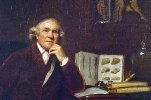Anatomy and philosophy
 Following up on The Knife Man and John Hunter, the great 18th-century anatomist and surgeon. In Hunter’s era surgery was brutal, in large part due to surgeons’ ignorance of anatomy, and in that earlier post I wondered why there was still such ignorance given that the 1700s were two centuries after Andreas Vesalius and a century after Francis Bacon.
Following up on The Knife Man and John Hunter, the great 18th-century anatomist and surgeon. In Hunter’s era surgery was brutal, in large part due to surgeons’ ignorance of anatomy, and in that earlier post I wondered why there was still such ignorance given that the 1700s were two centuries after Andreas Vesalius and a century after Francis Bacon.
Here’s my hypothesis: Philosophy has a lot to do with it.
Suppose you’re an early physician — your patients suffer and die, and you don’t know why. One option is not to think much of it: bad stuff happens, people die, accept it. It takes an active mind — curiosity, interest, follow through — for science to get going. Why do people die?
Even if you do decide to think about it, there are further obstacles.
One is the historically common belief that the gods cause things to happen. That metaphysical belief will stop you from looking for natural, anatomical causes.
If you reject religious cause-and-effect and suspect that the cause might be anatomical, there are aesthetic obstacles — think of the sights you will see, the textures you will feel, and (probably the worst) the odors you will smell.
There are moral obstacles: anatomy seems to disrespect the dead or to disrespect the living person the corpse once was. Moral obstacles might also be based on particular religious metaphysical beliefs, such as the resurrection of the body and so wanting to preserve the body intact for that eventuality.
So philosophy — metaphysics, morality, and aesthetics — can stop the impulse that leads to anatomy. And based on some or all of the above, there will be legal obstacles.
To those obstacles, all of which were operative in early modern Europe, let me add the epistemological barriers.
One was the reverence for tradition. Religion emphasized tradition, and the Renaissance respect for the ancients’ accomplishments often meant merely substituting a Greek or Roman authority for a Judeo-Christian one. For the early modern understanding of the inner workings of the human body, Galen’s humor theory was the mostly-unquestioned authority.
To the extent that early scientists were willing to think independently of traditional authorities, many simply speculated and spun theoretical just-so stories. An example here is Albrecht von Haller, a Swiss contemporary of John Hunter, who, based on no observational evidence, argued that every embryo was from day one already a perfect miniature of the mature organism and that embryonic development was merely a matter of increasing size.
And to the extent that anatomy was done, it was most often performed as a demonstration of traditional or speculative theories. Students would crowd around the anatomist while the professor read from the authoritative text telling the students what they were seeing. This usually meant that top-down confirmation bias simply reinforced the traditions and speculations.
So early anatomy was hobbled by three faulty epistemologies:
Tradition — the unthinking acceptance of others’ thinking.
Speculation — thinking independent of observation.
The demonstration method — observation only as the hand-maiden to thinking.
 The primacy of observation: that epistemological principle had to be articulated and institutionalized. That is what Francis Bacon did for philosophy in the 1600s and what John Hunter did for anatomy in the 1700s.
The primacy of observation: that epistemological principle had to be articulated and institutionalized. That is what Francis Bacon did for philosophy in the 1600s and what John Hunter did for anatomy in the 1700s.
Empiricism made anatomy possible. Anatomy made internal surgery possible. Surgery made dramatic live-saving and life-improvements possible. Conclusion: Philosophy is very practical.
Related:
My posts on Aristotle on the aesthetics of the “humbler animals” and Francis Bacon as the founder of modern philosophy.
Wendy Moore’s The Knife Man: Blood, Body Snatching, and the Birth of Modern Surgery [Amazon’s site].
Sherwin Nuland’s Doctors: The Biography of Medicine [Amazon’s site]. I love the chapter on Vesalius.
ISTM that we are currently seeing a shift in philosophy away from the idea that health care is something professionals do for you, back to the burden of personal cleanliness, sexual purity, natural foods, exercise, rest and sunshine. The last century was so trusting of science that it accepted eugenics, giving mind altering drugs to children, “safe” insecticides and herbicides, GMO and other such. Unfortunately, many have also leaped into the dark of Homeopathy and other bogus, irrational ideas.
I like your conclusion a lot. That is, unfortunately, what most people never understand: philosophy IS mostly theory, but from that theoretical knowledge should stem an urge for action, and practical application of theoretical truths. I would say, though, that even philosophers within a religious system or theology would be able to accomplish this “observation” in order to gain accurate scientific knowledge. If they understood their religion correctly, they would see that faith does not conflict with, or restrain, reason. True faith lets a believer search, with reason, for what is really real. Any thoughts on the subject?